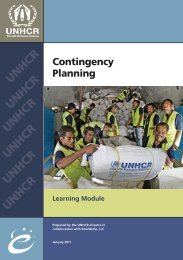Managing External Relations - Disaster Management Center ...
Managing External Relations - Disaster Management Center ...
Managing External Relations - Disaster Management Center ...
Create successful ePaper yourself
Turn your PDF publications into a flip-book with our unique Google optimized e-Paper software.
EP<br />
04<br />
24<br />
<strong>Managing</strong> <strong>External</strong> <strong>Relations</strong><br />
Feedback requires trust and acceptance. <strong>Relations</strong>hips among group members may not be<br />
developed enough to readily accept other members’ feedback. Giving feedback may be awkward in<br />
very formal settings. In some cultures, giving comments on another’s behaviour may be considered<br />
rude or may be misinterpreted.<br />
Facilitate the discussions — Regardless of the nature of your role as facilitator, your main job will<br />
include 1) keeping the discussion on track, 2) clarifying or asking for clarification when something<br />
seems confusing, and 3) helping to create and maintain a situation where everyone can participate in<br />
a co-operative manner. The way you do this will depend on your personal style. It is imperative that<br />
you keep communication lines open among group members. You can provide members with<br />
opportunities to express and hear each other’s feelings (‘How do you feel about this issue?’), ask for<br />
group feedback (‘Does anyone else have an interpretation of this?’), and provide suggestions for<br />
group response (‘Why don’t we return to this issue after lunch?’)<br />
Evaluate progress — While a facilitator may be able to guess how well a meeting is going, it is<br />
usually best to have a formal evaluation, either verbal or written, to verify or correct his/her<br />
impression. Taking a few minutes to evaluate group progress can allow the group to decide if there is<br />
a need for future meetings and give participants an opportunity to express thoughts they may have<br />
held back. If the group process is a long one requiring many meetings, you might issue updates and<br />
records of progress to the group via email or a briefing document.<br />
Problems in facilitation<br />
The problems of non-participation, resistance, and time constraints can make facilitation more<br />
difficult. Consider each of the following situations and answer the questions based on your own<br />
experience. Afterward, compare your answers to those in the text.<br />
Non-participation<br />
Reasons:<br />
Solutions:<br />
One or two people have dropped out of a group discussion about co-ordination<br />
arrangements for the emergency although the rest of the group seems<br />
involved. What might be some of the reasons and solutions for this situation?<br />
They may have personal reasons for being distracted or may not be able to relate to the rest of the<br />
group. It is important to read this situation carefully to determine if the problem should be dealt with<br />
openly by the group. If the behaviour is disruptive, you may try to ask the dropouts if there are any<br />
comments they would like to make—giving them an opportunity to express dissatisfaction. If no<br />
disruption is involved, you may wait for a break in the meeting to ask in a friendly manner if they are<br />
dissatisfied with the meeting. While a facilitator should respect the privacy and wishes of participants,<br />
if the problem has to do with the purpose or process, it may be necessary to bring it to the<br />
attention of the whole group for resolution. In an emergency, group acceptance of the plan may be<br />
as important as the elements of the plan.








